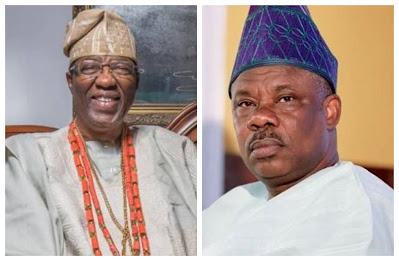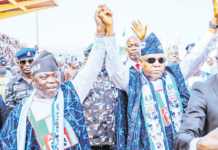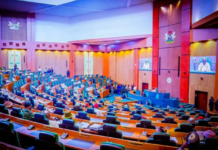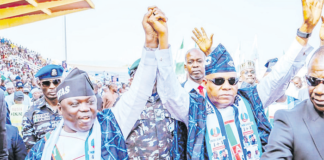“The Cost of Vendetta Politics…,” Ogun State Pays the Price
When Senator Ibikunle Amosun assumed office as governor in 2011, he had the opportunity to complete these crucial projects and continue the trajectory of growth for the state. Instead, Amosun chose to abandon most of these initiatives, driven not by a strategic vision for the state but by a vendetta against his predecessor
Governance thrives when it is treated as a continuous process, where each administration builds upon the groundwork laid by its predecessors. Unfortunately, in Ogun State, this principle has been repeatedly undermined by a cycle of vendetta and victimization, where successive leaders choose to dismantle rather than develop the initiatives they inherit.
A glaring example of this destructive pattern is the rivalry between Senator Ibikunle Amosun and his predecessor, Otunba Gbenga Daniel (OGD). The fallout from this political discord is still evident today, as Ogun State and indeed the whole nation grapple with the threat against our sovereignty and seizure of our national assets in faraway Paris.
During his tenure as governor from 2003 to 2011, Otunba Gbenga Daniel embarked on several ambitious projects that had the potential to transform Ogun State’s economy. These included the Agro-Cargo Airport, the Independent Power Plant, the Olokola Deep Seaport, and the Ogun Guangdong Free Trade Zone (FTZ) development deal with Zhongshan in 2007. These initiatives were not just projects; they were visionary steps towards making Ogun State a major economic hub in Nigeria.
However, when Senator Ibikunle Amosun assumed office as governor in 2011, he had the opportunity to complete these crucial projects and continue the trajectory of growth for the state. Instead, Amosun chose to abandon most of these initiatives, driven not by a strategic vision for the state but by a vendetta against his predecessor. Amosun’s disdain for OGD’s legacy was evident in his public criticisms, where he accused Daniel’s administration of corruption and mismanagement. These accusations were not just political rhetoric; they were part of a broader strategy to undermine OGD’s achievements and erase his influence from Ogun State’s history.
The abandonment of these projects was not merely a lapse in judgment but a calculated move to distance his administration from Daniel’s. By discarding these initiatives, Amosun not only missed a critical opportunity to advance the state’s development but also did a grave disservice to the people of Ogun State. This act of political victimization has left the state suffering the consequences of abandoned projects and missed economic opportunities.
One of the most glaring examples of this is the $20 billion Dangote Refinery Project, which was initially considered for Ogun State. However, due to Amosun’s political manoeuvring and lack of foresight, the project was eventually moved to Lagos State. This single decision deprived Ogun State of what could have been a monumental economic boost, creating jobs and infrastructure that would have significantly improved the lives of its citizens.
Another critical project that fell victim to Amosun’s vendetta was the Ogun Guangdong Free Trade Zone (FTZ) development deal with Zhongshan. Otunba Gbenga Daniel had secured this deal in 2007, envisioning it as a cornerstone for Ogun State’s transformation into an international trade hub. However, in 2015, Senator Amosun abruptly terminated the contract without considering the legal and economic consequences. This reckless decision not only disrupted a project that could have brought immense benefits to the state but also exposed Ogun State and Nigeria to substantial financial liabilities. The situation escalated when three presidential aircraft were seized in France to enforce a ~$70 million judgment against the Federal Government—a direct consequence of the failed FTZ deal.
This destructive political rivalry has brought shame and debt upon the people of Ogun State and Nigeria at large. Amosun’s thoughtless and irrational decisions, combined with Daniel’s inability to complete his ambitious projects, have left the people of Ogun State bearing the heavy cost of missed opportunities and unrealized potential.
The abandonment of the Agro-Cargo Airport, the Olokola Deep Seaport, and the Independent Power Plant are not just isolated incidents; they are emblematic of a larger failure of leadership. These projects, if completed, could have transformed Ogun State into a thriving economic powerhouse. Instead, they stand as monuments to political vendetta, with the people of Ogun State left to suffer the consequences.
The politics of vendetta and victimization have no place in governance. True leadership is not about erasing the legacy of one’s predecessors but about building on it for the greater good. Amosun’s administration, while making strides in infrastructure, ultimately failed the people of Ogun State by allowing personal vendettas to dictate governance. The stunted development and abandoned projects are a testament to this failure—a failure that continues to haunt Ogun State to this day.
In light of the current trajectory of Ogun State’s development, it is important to recognize the missed opportunities that have left a lasting impact on the state’s progress. Imagine a scenario where the Agro-Cargo Airport had been brought to fruition, where the Olokola Deep Seaport was a thriving hub of maritime trade, where the Independent Power Plant was supplying reliable energy, and where the $20 billion Dangote Refinery project had found its home in Ogun State. Such achievements would have significantly altered the state’s economic landscape, fostering growth, creating jobs, and enhancing the quality of life for its residents.
However, the reality is different, shaped by decisions rooted in short-term gains and personal rivalries rather than long-term vision. The lessons here are not just about what was lost, but about the critical importance of foresight and the collective responsibility of leadership. True leadership lies not in tearing down the work of predecessors but in building upon it, ensuring that the foundation laid by one administration becomes the stepping stone for the next.
Ogun State’s potential has been hampered by a cycle of discontinuity, where the ambitions of one leader are discarded by the next, resulting in a patchwork of half-completed projects and unrealized dreams. This is a cautionary tale about the dangers of allowing personal agendas to overshadow the broader goal of state development. The real question we must ask is not just “What if?” but “What now?” How do we ensure that the future is not a repetition of the past but a departure towards sustained progress?
As we look forward, it is crucial for the current administration under Governor Dapo Abiodun to learn from these past missteps. The path of vendetta and political victimization has proven detrimental to the state’s progress. It is now instructive for the current leadership to avoid the pitfalls of their predecessors by prioritizing continuity, collaboration, and the collective good over personal vendettas. By doing so, they can create a legacy that transforms Ogun State into an ivory of development, where the aspirations of today become the achievements of tomorrow.
Credit: Apples Bite















